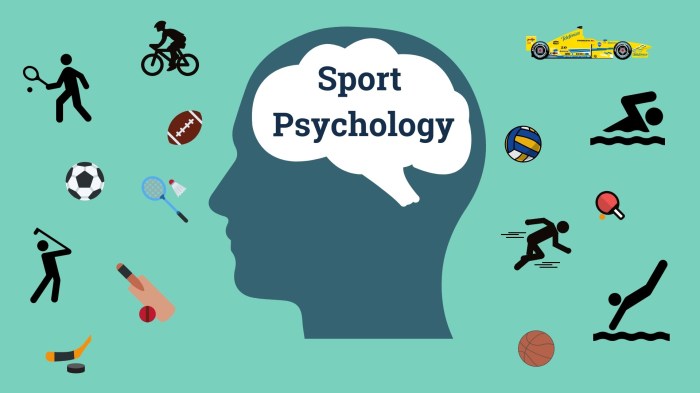Sports psychology delves into the minds of athletes, unlocking the secrets to peak performance and mental well-being in the midst of intense competition. From visualization techniques to stress management, this field offers a fascinating journey into the psychology of sports.
Introduction to Sports Psychology

Sports psychology is a specialized field that focuses on the mental aspects of athletic performance. It plays a crucial role in helping athletes develop the right mindset, cope with pressure, and enhance their overall performance on the field. Sports psychologists work closely with athletes to identify mental barriers, set goals, and implement strategies to improve their mental well-being and performance.
Role of Sports Psychologists, Sports psychology
Sports psychologists play a key role in helping athletes overcome challenges and reach their full potential. They work with athletes to develop mental skills such as visualization, goal-setting, and positive self-talk. By addressing issues like anxiety, stress, and confidence, sports psychologists help athletes perform at their best when it matters most.
Examples of Impactful Techniques
- Visualization: Athletes visualize themselves successfully executing their skills, which helps improve muscle memory and performance under pressure.
- Goal-Setting: Setting specific, measurable goals helps athletes stay focused and motivated, leading to improved performance and results.
- Positive Self-Talk: Encouraging positive self-talk can boost confidence and resilience, helping athletes overcome setbacks and perform at a high level.
Mental Skills Training in Sports Psychology
Sports psychology plays a crucial role in helping athletes maximize their performance by focusing on mental skills training. By working on various psychological techniques, athletes can enhance their mental toughness, resilience, and overall well-being, leading to improved athletic success.
Visualization
Visualization is a powerful mental skill used in sports psychology where athletes create detailed mental images of themselves successfully executing their desired performance. By visualizing their goals, athletes can enhance their confidence, reduce anxiety, and improve their overall performance on the field.
Goal Setting
Goal setting is another essential mental skill in sports psychology that helps athletes establish clear and achievable objectives. By setting specific, measurable, attainable, relevant, and time-bound goals, athletes can stay motivated, focused, and committed to their training and competitions, leading to improved performance outcomes.
Self-Talk
Self-talk refers to the internal dialogue that athletes have with themselves during training and competitions. Positive self-talk can help athletes build confidence, manage stress, and maintain focus under pressure. By replacing negative self-talk with positive affirmations, athletes can overcome performance anxiety and enhance their mental resilience during challenging situations.
Psychological Strategies for Performance Enhancement

In sports psychology, there are various psychological strategies that athletes can utilize to improve their performance on the field or court. These strategies focus on enhancing mental skills to optimize athletic potential and achieve peak performance.
Arousal Regulation
Arousal regulation involves managing the level of excitement or energy an athlete experiences before and during competition. Athletes can use techniques such as deep breathing, visualization, or positive self-talk to control their arousal levels. By finding the optimal level of arousal, athletes can improve focus, concentration, and overall performance.
Attention Control
Attention control is another essential psychological strategy in sports psychology. Athletes need to maintain focus on relevant cues while ignoring distractions during competition. Techniques like mindfulness meditation, cue words, or attentional narrowing can help athletes concentrate on the task at hand and improve decision-making under pressure.
Stress Management
Stress management is crucial for athletes to perform at their best. High levels of stress can negatively impact performance by causing anxiety, tension, and decreased focus. Athletes can learn stress management techniques such as progressive muscle relaxation, imagery, or goal setting to cope with pressure and enhance performance outcomes.
These psychological strategies in sports psychology play a vital role in helping athletes achieve their full potential and excel in their respective sports. By implementing these techniques, athletes can enhance their mental skills, overcome obstacles, and perform at the highest level possible.
The Impact of Sports Psychology on Injury Recovery
Sports psychology plays a crucial role in helping athletes cope with injuries and facilitating their recovery process. By focusing on mental resilience and maintaining a positive mindset, sports psychologists support athletes through the challenging period of injury rehabilitation.
Benefits of Sports Psychology Techniques in Injury Recovery
- Enhanced coping mechanisms: Sports psychology techniques help athletes develop effective coping strategies to deal with the emotional and psychological impact of injuries.
- Improved motivation: By working with sports psychologists, athletes can maintain their motivation and focus on their recovery goals, even during setbacks.
- Reduced anxiety and stress: Techniques such as visualization and relaxation exercises can help athletes manage anxiety and stress associated with the fear of re-injury.
Role of Mental Resilience in Injury Rehabilitation
- Positive mindset: Maintaining a positive attitude throughout the recovery process can speed up physical healing and improve overall well-being.
- Adaptability: Sports psychologists help athletes adapt to the challenges of rehabilitation and develop a resilient mindset to overcome obstacles.
Support from Sports Psychologists During Injury Recovery
- Emotional support: Sports psychologists provide athletes with a safe space to express their emotions and concerns related to their injury, fostering mental well-being.
- Goal setting: Setting realistic and achievable goals with the help of sports psychologists can keep athletes motivated and focused on their recovery journey.
- Continuous monitoring: Sports psychologists closely monitor the athlete’s progress and adjust mental strategies as needed to ensure a successful recovery.
